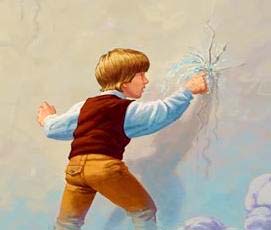1. Many years ago, there lived in Holland a boy named Peter. Peter's father was one of the men who watched the gates in the dikes, called sluices. He opened and closed the sluices so that ships could pass out of Holland's canals into the great sea.
許多年前,荷蘭有一個(gè)名叫彼得的男孩。彼得的父親是一名堤壩水閘的看閘人。他的主要工作是打開(kāi)和關(guān)閉水閘,以便讓船只從荷蘭境內(nèi)的運(yùn)河進(jìn)入大海。
2. One afternoon in the early fall, when Peter was eight years old, his mother called him. "Come, Peter," she said. "I want you to go across the dike and take these cakes to your friend, the blind man. If you go quickly, and do not stop to play, you will be home again before dark."
彼得八歲那年一個(gè)初秋的下午,母親喊彼得:“過(guò)來(lái),彼得。我要你過(guò)到堤壩那邊,把這些蛋糕拿給你的那位盲人朋友。如果你走得比較快,不停下來(lái)玩的話,你就可以在天黑前回到家。”
3. The little boy was glad to go and off he went with a light heart. He stayed with the poor blind man a little while, to tell him about his walk along the dike; about the sun and the flowers and the ships far out at sea. Then he remembered his mother's wish that he should return before dark and, bidding his friend goodbye, he set out for home.
小男輕松愉快地出發(fā)了。到了目的地之后,他和他那位可憐的盲人朋友呆了一會(huì)兒,向他的盲人朋友講述了他沿堤壩來(lái)的路上見(jiàn)到的事物——太陽(yáng)和鮮花以及遠(yuǎn)在海上的船只。然后,他想起了母親希望他在天黑之前回家的事情,于是與朋友告別后,便出發(fā)回家。
4. As he walked beside the canal, he noticed how the rains had heightened the waters, and how they beat against the side of the dike, and he thought of his father's gates. "I am glad they are so strong," he said to himself. "If they gave way what would happen? These pretty fields would be covered with water. Father always calls them the 'angry waters.' I suppose he thinks they are angry at him for keeping them out so long."
沿著運(yùn)河邊走時(shí),他注意到雨水是如何讓水位漲高,以及海水是如何拍打在堤壩上,同時(shí)他還想到了父親看守的水閘。“堤壩這么牢固,這真令我高興,” 他自言自語(yǔ)地說(shuō),“如果這堤壩塌了,將會(huì)發(fā)生什么?這些美麗的田野將會(huì)被水淹沒(méi)。父親總是把這樣的海水稱為“憤怒的海水”。我猜他是認(rèn)為這海水是因?yàn)楸凰钃踉诘虊文沁吥敲淳貌艑?duì)他發(fā)怒的。
5. As he walked along, he sometimes stopped to pick the pretty blue flowers that grew beside the road, or to listen to the rabbits´ soft tread as they rustled through the grass. Suddenly he noticed that the sun was setting, and that it was growing dark. "Mother will be watching for me," he thought, and he began to run toward home. Just then he heard a noise. It was the sound of trickling water! He stopped and looked down. There was a small hole in the dike, through which a tiny stream was flowing. Any child in Holland is frightened at the thought of a leak in the dike.
他沿著堤壩走時(shí),有時(shí)會(huì)停下腳步,摘幾朵長(zhǎng)在路邊的漂亮的藍(lán)色花朵,或是聽(tīng)一聽(tīng)兔子在穿過(guò)草叢時(shí)發(fā)出的沙沙作響聲以及柔軟的踩踏聲。突然,他注意到太陽(yáng)正在落山,天就要黑了。他心想:“媽媽正等著我呢,”。于是,他開(kāi)始朝家的方向奔去。就在這時(shí),他聽(tīng)到了一個(gè)聲音,是小股水流淌的聲音!他停下來(lái),低頭看去。堤壩上有一個(gè)小孔,小股水流正從孔中涌出。一想到堤壩泄漏,任何一個(gè)荷蘭孩子都會(huì)感到害怕。
6. Peter understood the danger at once. If the water ran through a little hole it would soon make a larger one, and the whole country would be flooded. In a moment he saw what he must do. Throwing away his flowers, he climbed down the side of the dike and thrust his finger into the tiny hole. The flowing of the water was stopped!
彼得立刻意識(shí)到了危險(xiǎn)。如果水流過(guò)一個(gè)小孔,這個(gè)小孔很快就會(huì)變大,然后整個(gè)國(guó)家都會(huì)被洪水淹沒(méi)。他很快就知道自己該怎么做了——他扔掉了手中花,從堤壩的側(cè)面爬了下去,將自己的一根手指戳進(jìn)了那個(gè)小孔。水流停止了!
9. Peter tried to whistle, but his teeth chattered with the cold. He thought of his brother and sister in their warm beds, and of his dear father and mother. "I must not let them be drowned," he thought. "I must stay here until someone comes, if I have to stay all night."
彼得試圖吹出口哨聲,但是他的牙齒正因寒冷而顫抖。他想到了正在溫暖的床上躺著的弟弟和妹妹,以及他親愛(ài)的父母。“我決不能讓水淹到他們,”他想,“如果我不得不整夜呆在這里,我就必須待在這里直到有人來(lái)。”
10. The moon and stars looked down on the child crouching on a stone on the side of the dike. His head was bent, and his eyes were closed, but he was not asleep, for every now and then he rubbed the hand that was holding back the angry sea. "I'll stand it somehow," he thought. So he stayed there all night keeping the sea out. Early the next morning a man going to work thought he heard a groan as he walked along the top of the dike. Looking over the edge, he saw a child clinging to the side of the great wall.
月亮和滿天的星斗低頭看著這個(gè)正俯身蹲在堤壩側(cè)面一塊石頭上的孩子。他的頭垂了下去,眼睛閉上了,但他并沒(méi)有睡著,因?yàn)樗€會(huì)時(shí)不時(shí)地搓一搓正擋著憤怒的海水的那只手。“不管怎樣,我都會(huì)堅(jiān)持下去的,”他想。于是,他真的在那里堅(jiān)持了一整夜,成功地把海水擋在了堤壩以外。第二天一早,一個(gè)男子正沿著堤壩頂部走在上班路上時(shí),覺(jué)得自己聽(tīng)到了一個(gè)呻吟聲。他仔細(xì)地向堤壩邊緣看去,看到了一個(gè)孩子正緊貼著大壩的側(cè)面。
11. “What's the matter?" he called. "Are you hurt?" "I'm keeping the water back!" Peter yelled. "Tell them to come quickly!" The alarm was spread. People came running with shovels and the hole was soon mended. They carried Peter home to his parents, and not long after the whole town knew that he had saved their lives that night. To this day, they have never forgotten the brave little hero of Holland.
“怎么了?”他呼喊道,“你受傷了嗎?”“我正在把水擋回去!”彼得喊道,“快叫人來(lái)幫忙!”告警聲擴(kuò)散開(kāi)來(lái)。人們紛紛手持鐵鍬跑了過(guò)來(lái),很快那個(gè)孔就被修補(bǔ)上了。然后,他們把彼得帶回了家,見(jiàn)到了他的父母。不久后,整個(gè)鎮(zhèn)子的人都知道了那天晚上是彼得救了他們。直到今天,那里的人們?nèi)糟懹浿@位勇敢的荷蘭小英雄。











